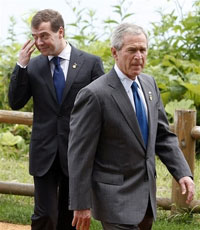Russia reaches no progress in talks with US during G8 summit
Russian President Dmitry Medvedev said Tuesday that his first meeting with U.S President George W. Bush since taking office brought no progress toward bridging deep disagreements between the former Cold War foes.

Deeply wary of creeping Western clout in former Soviet republics and satellite states, Russia adamantly opposes the Bush administration's plans to deploy missile defense installations in Central Europe and its support for bids by Georgia and Ukraine to join NATO.
Medvedev said Tuesday that some of the countries' interests coincide. On their differences, however, "there is no particular progress," he said, following Monday's meeting on the sidelines of the Group of Eight economic powers summit. "We continue to exchange opinions."
The Russian leader added that he wants good relations with Bush's successor in the White House, and that he and Bush agreed the U.S. election campaign should not slow the pace of contacts between the two powerful, nuclear-armed nations.
"We expressed our mutual opinion that under no conditions should we allow a pause in the relations," Medvedev said. He said that "irrespective of who wins in the elections, we are interested in normal, comprehensive and constructive relations with the U.S. Administration."
Medvedev has pledged continuity in Russia's foreign policy since taking over the presidency from Vladimir Putin but has tended to assert Moscow's position in less confrontational language than his predecessor.
U.S. Secretary of State Condoleezza Rice was expected to sign an agreement Tuesday to build a radar installation for the missile shield in the Czech Republic. The United States is also in talks to build a missile installation in Poland.
Russia says it is not convinced by U.S. insistence that the shield is meant to neutralize a potential Iranian threat and suspects the true aim is to weaken Russia.
Opposing the U.S. on one of the debates at the summit, a Russian official said Moscow is against imposing financial or other sanctions on Zimbabwe over President Robert Mugabe's widely condemned re-election last month.
The official suggested that Russia, a veto-wielding permanent U.N. Security Council member, believed sanctions might spark further unrest.
"We don't believe in sanctions in this particular case as an effective tool to improve the situation," said Alexander Pankin, a deputy Foreign Ministry department chief. He said Russia advocates "broad negotiation" involving African leaders.
"It's important to maintain peace and stability in Zimbabwe, and not to trigger a situation which would be unstoppable or could unfold in a very negative way."
Russia has often argued against sanctions and has used its power in the Security Council to water down U.S.-backed sanctions against Iran over its nuclear program.
At the summit, Bush failed to achieve a consensus among African leaders on sanctions against the Mugabe government.
Medvedev also met for the first time Monday with British Prime Minister Gordon Brown, but their talks brought no visible progress on several bitter disputes that have badly hurt ties.
"It was a rather long-awaited meeting," Medvedev said. "It did not go badly. We discussed existing problems, prospects."
Some Russian analysts suspect Putin's choice of the 42-year-old former lawyer and law teacher as a successor, rather than a more hawkish figure, was aimed at easing tension with the West without giving ground on major issues.
Putin, barred from seeking a third straight term, ensured Medvedev's election in March by singling him out as his favored successor. The former Russian leader then moved to the prime minister's post and now heads the country's dominant political party, raising questions about who holds the reins.
Subscribe to Pravda.Ru Telegram channel, Facebook, RSS!


